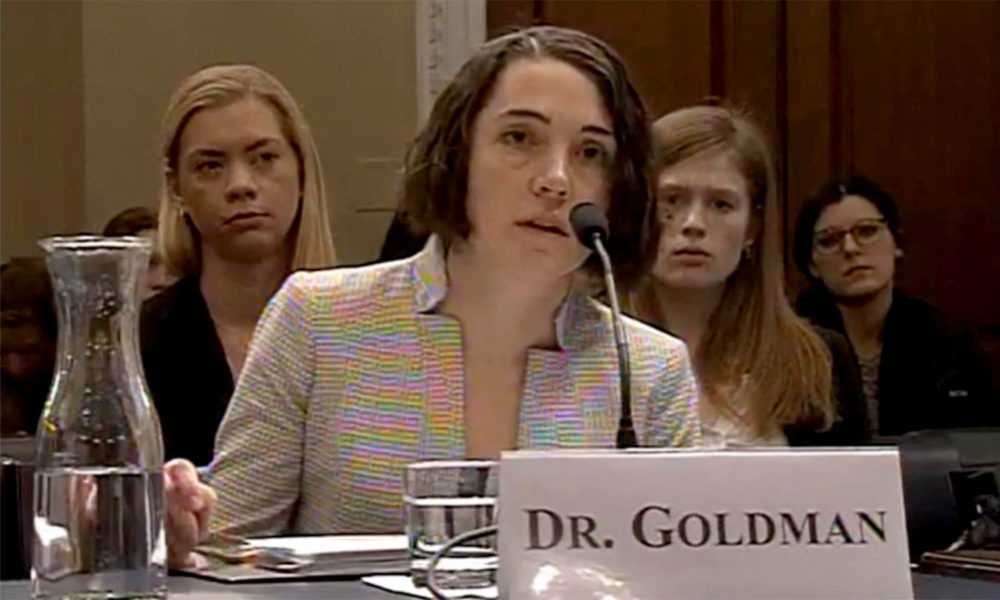Today I had the opportunity to testify to Congress on an important bill, The Transparency in Energy Production Act of 2020, that would require energy companies that lease federal land to disclose more about their social and environmental impact. This is an important idea that I have been advocating for over many years and several reports. My full written testimony is here, and the oral testimony I delivered today is below. You can watch the full hearing here. Stay tuned here and with your member of Congress on these important efforts to ensure that communities have greater access to the information on health and environmental threats from fossil energy production.
Thank you, Chairman Lowenthal and Ranking Member Gosar, for the opportunity to testify at this important hearing. My name is Dr Gretchen Goldman, and I serve as the Research Director in the Center for Science and Democracy at the Union of Concerned Scientists. For nearly a decade, I have been working on corporate engagement on climate science and policy, community right to know, and public access to scientific information.
Communities around the country have long been affected by the activities of the fossil energy industry. These communities endure environmental hazards and health impacts without even knowing what’s in the air they breathe or the water they drink. This is the reason regulatory safeguards and disclosure requirements exist: To protect people. Energy companies have an obligation to disclose the social and environmental impacts of their operations.
These are commonsense expectations, yet current disclosure by the fossil energy industry is woefully inadequate. Companies continue to operate on public lands, close to residential areas, and with minimal oversight. This lack of disclosure leaves decisionmakers, investors, and communities in the dark, costing taxpayers and threatening public health and safety. This is why we need legislation like The Transparency in Energy Production Act of 2020. HR 5636 would help ensure access to the vital information that can protect the public and promote responsible corporate governance.
Voluntary disclosure is insufficient
A record of bad behavior demonstrates that the fossil energy industry needs our oversight, not our trust. Fossil energy companies have consistently failed to report sufficient details on their social and environmental impact, despite requirements of the US Securities and Exchange Commission and despite investor and public pressure. If companies aren’t honest about what is happening in their own backyards, how can we trust them to be honest about what is happening in ours?
Companies’ social license to operate is contingent upon their being a transparent and responsible actor. Unfortunately, from refusals to share basic information with decisionmakers and medical personnel, to preventable explosions that have evacuated entire communities, to illegal dumping and unsafe practices, fossil energy companies have lost the public trust. This isn’t just about disclosure; it is about the rights of communities to know about public health threats and to have the information they need to protect themselves.
Lack of disclosure harms the public
When this information is concealed, people are unable to make informed decisions in their daily lives. Should my child play in our yard? Can I safely drink my tap water? Is the air safe to breathe? The answers to these simple questions can mean the difference between an uneventful day or another trip to the emergency room.
Increasingly and disproportionately, it is low-income communities, communities of color, and Indigenous communities living, working, and going to school near energy production sites. It is these communities that must ask these questions and face companies’ insufficient answers. Continued lack of disclosure by the fossil energy industry has meant communities have had to advocate for themselves, negotiating with companies, conducting community science, and fighting in the courts—all to access information that should be public.
Disclosure is reasonable and long overdue
The disclosures outlined by HR 5636 are feasible and long overdue. Fossil energy companies routinely collect data on the well sites, chemicals, wastewater, and other environmental monitoring. It is a reasonable and necessary that these data be shared in an open, timely, and accessible way. The Sustainability Accounting Standards Board disclosures requested in the bill were produced working closely with the extractive industries and align with the disclosures that public companies must anyway report annually to the US Securities and Exchange Commission.
Conclusion
When energy companies fail to disclose their human and environmental footprints, it is others who will pay the price. The public pays in tax dollars when first responders, healthcare workers, local governments, and federal aid services must respond to disasters at fossil energy facilities. And nearby communities pay every day when they are exposed to harm from routine emissions, leaks, and other damages made worse by poor disclosure and management. Companies owe it to all of us to be responsible actors. The Transparency in Energy Production Act will help keep families informed, corporations held accountable, and the public safe. This is a future worth striving for.

